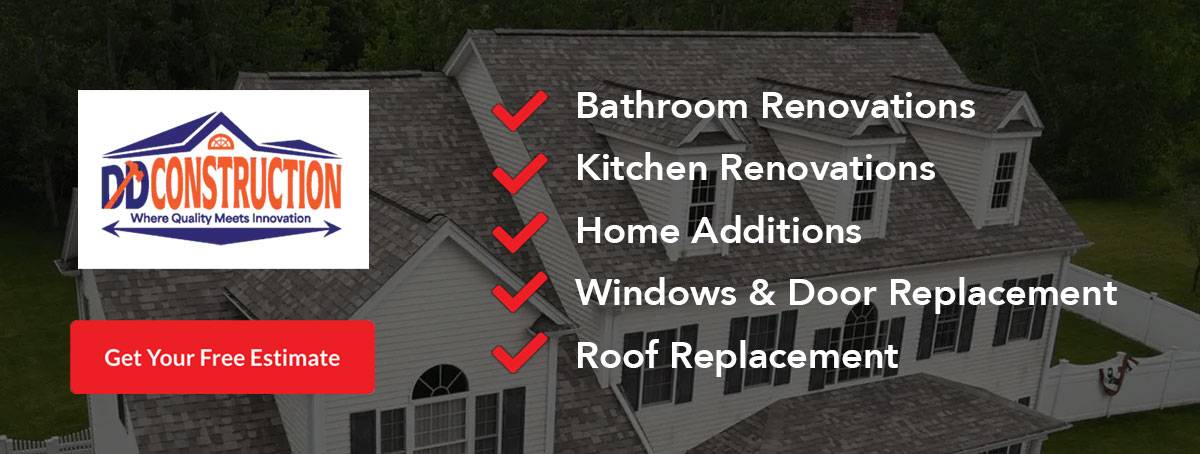Window replacement is a major home improvement investment that not only enhances aesthetic appeal and comfort but also lowers long-term energy expenses. In Massachusetts, where severe weather and strict building codes demand efficient insulation, upgrading to new windows can substantially reduce energy bills, increase property value, and offer lasting financial benefits. This article explains how window replacement lowers energy bills, improves home performance and market value, and how expert installation (dd construction) and local incentives such as the Mass Save program further improve a homeowner’s return on investment.
Understanding how modern windows work is key to realizing their energy-saving potential. Energy loss from outdated or poorly installed windows can account for a significant portion of monthly energy expenses. Installing energy-efficient windows—such as double-pane and triple-pane models with low-emissivity (Low-E) coatings—dramatically cuts heat loss during cold winters and minimizes solar heat gain during warm summers. These improvements create a more comfortable indoor environment by reducing reliance on heating and cooling systems, thereby lowering utility bills and reducing one’s carbon footprint.
In Massachusetts, with climates ranging from bitterly cold winters to humid summers, window replacement is both an investment in energy efficiency and overall home performance. Homeowners who upgrade to modern windows often realize immediate energy use reductions, along with long-term advantages including higher property value, lower maintenance costs, and eligibility for rebate programs like Mass Save. With modern technology and professional installation practices, the transition to efficient windows is both seamless and financially rewarding.
How Does Window Replacement Save Money on Energy Bills?
Replacing older windows with modern, energy-efficient models saves money on energy bills primarily by decreasing thermal losses. New windows with double-pane or triple-pane designs, improved seals, and Low-E coatings form a robust barrier that minimizes heat exchange. By eliminating drafts and enhancing insulation, these windows reduce the need for constant heating in harsh winters and excessive cooling in hot summers.
Advancements in glass technology and framing methods also help limit conduction, convection, and radiation. Multiple layers of glass with inert gas fillings reduce heat flow much more effectively than single-pane windows. Low-E coatings reflect infrared radiation, retaining more warmth indoors during winter and keeping interiors cooler in summer. In many cases, homeowners experience up to a 20%–30% reduction in heating and cooling expenses, which can pay off the investment in several years.
Energy-efficient windows also improve overall heating system performance. With a better thermal envelope, furnaces and heat pumps run more efficiently and with less strain, often extending their operational life. However, even the best windows will underperform if not installed properly. Gaps or misalignments can negate energy savings. Therefore, expert installation that meets local building codes is essential. Additionally, state-sponsored incentives, such as those available through Mass Save, help reduce the upfront cost and shorten the payback period.
What Are the Long-Term Financial Benefits of Replacing Windows?
Beyond immediate energy bill reductions, window replacement offers long-term financial benefits that boost a home’s value and appeal. Modern, energy-efficient windows are highly attractive in competitive real estate markets like Massachusetts; updated windows can command higher resale values and offer a quick return on investment. Energy savings accumulate over the years, and many homeowners see a payback period of only a few years after installation, after which all subsequent savings add to profit.
New windows are built to last. High-quality, energy-efficient windows are designed to perform reliably for decades even under extreme weather conditions. Reduced repair and maintenance costs over a long period further enhance their financial appeal. Extended manufacturer warranties add an extra layer of protection and reduce unforeseen expenses. In addition, enhanced indoor comfort, consistent temperatures, and improved air quality lead to a better living environment, further boosting property marketability and resale value.
Local and federal incentive programs—including tax credits and rebates from programs like Mass Save—help offset the initial investment, making window replacement one of the safest and most profitable home improvements available.
Which Window Types and Materials Offer the Best Savings in Massachusetts?
Selecting the right window type and material is crucial to maximizing energy savings and long-term financial benefits. In Massachusetts, homeowners typically choose from vinyl, wood, and fiberglass windows.
• Vinyl Windows • Vinyl windows are popular for their excellent thermal performance and low cost. They offer high insulation levels, require minimal maintenance, and are manufactured to strict Energy Star standards. Their affordability and efficiency typically result in a quicker payback period.
• Wood Windows • Wood windows offer classic aesthetics and natural insulation but usually require more maintenance such as regular painting or sealing. Modern wood windows with advanced glazing and low-maintenance finishes can perform competitively, though their higher cost may extend the return on investment.
• Fiberglass Windows • Fiberglass windows are extremely durable and maintain structural integrity in extreme temperatures. They offer performance on par with vinyl windows along with reduced maintenance needs, making them attractive despite a higher initial cost.
The choice between double-pane and triple-pane windows further depends on regional climate and energy usage. In milder conditions, double-pane windows may be sufficient to reduce energy loss, whereas in harsh winters triple-pane windows—providing an extra insulating layer—can offer additional benefits, albeit at higher cost. Energy Star certification is an additional assurance that the chosen windows meet strict performance criteria, and it can also help homeowners qualify for rebates and tax credits.
Ultimately, the best window type and material depend on balancing upfront investment, maintenance costs, aesthetics, and expected energy savings to achieve long-term value.
How Do Massachusetts Building Codes and Climate Affect Window Replacement Savings?
Massachusetts building codes and its challenging climate have a significant impact on window performance and the resulting energy savings. Local codes mandate minimum requirements for energy efficiency, such as minimum R-values and strict sealing standards, to ensure that windows reduce energy loss. Compliance with these codes means that window replacement projects not only meet regulatory standards but also maximize energy efficiency.
The state’s climate—with extremely cold winters and warm summers—requires windows that can effectively minimize heat loss in winter and reduce solar heat gain in summer. High-performance windows help maintain comfortable indoor temperatures, reducing the need for excessive heating and cooling.
Local energy efficiency programs, such as Mass Save, offer rebates and financial incentives to encourage homeowners to upgrade to energy-efficient windows. These incentives, combined with professional installation that ensures compliance with local building codes, ensure that homeowners get the maximum energy savings and longest-lasting performance from their new windows.
What Are the Costs and Financing Options for Window Replacement in Massachusetts?
The cost of window replacement in Massachusetts depends on factors such as window type, materials, design, and installation complexity. On average, standard window installations cost between $500 and $1,000 per window. High-performance windows—especially triple-pane models or those featuring advanced Low-E coatings—can be more expensive, sometimes costing up to $1,500 per window.
Labor costs, contractor reputation, and adherence to stringent building codes also factor into the total cost. However, many homeowners find that reduced energy bills and increased property value quickly justify the upfront expense.
Financing options are plentiful. Many banks, credit unions, and contractors offer low-interest loans, home improvement lines of credit, or pay-as-you-save programs. Additionally, state-sponsored programs like Mass Save provide rebates and tax credits that further offset costs. A professional home energy assessment can help determine the most cost-effective strategy, ensuring that the selected windows yield the greatest savings over time.
Why Choose Expert Installation Services for Window Replacement Savings?
Expert installation is critical to achieving the full energy-saving potential of new windows. Even the highest quality, energy-efficient windows will underperform if not installed properly. Certified professionals understand the importance of precise measurements, proper sealing, and secure fitting—all of which prevent air leaks and moisture intrusion.
Professional installers follow industry-standard practices, using appropriate flashing, weather-stripping, and insulation techniques, ensuring that the windows work cohesively with the home’s overall thermal envelope. Their expertise not only maximizes energy savings but also ensures compliance with local building codes, thereby preserving warranty coverage and qualifying the installation for rebate programs.
In addition, professional installation enhances the longevity of windows and improves the home’s overall aesthetic appeal and resale value.
What Additional Benefits Complement the Long-Term Savings of Window Replacement?
Beyond energy and financial savings, window replacement offers numerous additional benefits:
• Enhanced Home Comfort: New windows reduce drafts and stabilize indoor temperatures, creating a consistently comfortable living environment. • Improved Noise Reduction: Modern windows are designed to minimize external noise, which is particularly valuable in urban areas or near busy streets. • Increased Curb Appeal: Updated windows can refresh a home’s exterior appearance, complement contemporary architectural styles, and boost overall property value. • Environmental Benefits: Lower energy consumption leads to reduced greenhouse gas emissions, contributing to a more sustainable and environmentally friendly home.
These benefits work together to not only lower monthly energy bills but also enhance overall property value and quality of life, making window replacement a smart long-term investment.
Frequently Asked Questions
Q: How long does it generally take to see savings on energy bills after replacing windows? A: Most homeowners begin to see reduced energy bills within the first few months after installation, as improved insulation quickly lowers heating and cooling demands. Over one to three years, the cumulative savings become significant.
Q: Can window replacement increase my home’s resale value? A: Yes, energy-efficient windows can boost a home’s resale value by 3% to 10%, as they signal lower future utility costs and modern, well-maintained features to potential buyers.
Q: Are there rebates or financing options available in Massachusetts? A: Absolutely. Programs like Mass Save offer rebates, tax credits, and low-interest financing. Additionally, many local banks and contractors provide home improvement loans, making the investment more affordable.
Q: What maintenance is required for energy-efficient windows? A: Energy-efficient windows, especially those made from vinyl or fiberglass, require minimal maintenance compared to older models. Routine cleaning and occasional inspections to ensure proper sealing are typically sufficient.
Q: How can I calculate the return on investment (ROI) for window replacement? A: ROI can be calculated by comparing the upfront costs of purchasing and installing windows with the projected annual savings on energy bills, increased property value, and any applicable rebates. Many online calculators and home energy assessments can provide estimates.
Q: Why is professional installation so important? A: Professional installation ensures that windows are correctly aligned, sealed, and integrated with your home’s structure, preventing energy loss due to gaps or improper fitting. This not only maximizes efficiency but also helps secure manufacturer warranties and local rebates.
Q: How do triple-pane windows compare to double-pane windows in energy efficiency? A: Triple-pane windows provide an extra layer of insulation and often yield up to an additional 5% to 10% energy cost reduction compared to double-pane windows, making them particularly beneficial in extremely cold climates.
By understanding these key aspects—energy savings, long-term financial benefits, material choices, local building code requirements, costs and financing options, professional installation importance, and additional benefits—Massachusetts homeowners can make informed decisions that optimize energy efficiency and overall home performance through window replacement.





